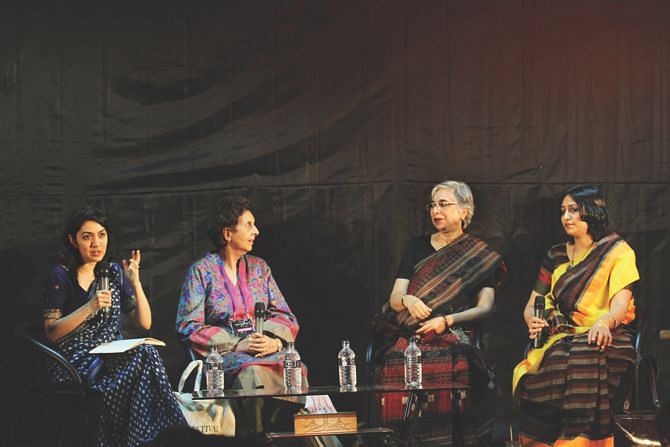The lipstick and the pomegranate

“If you read a man's narrative, you just know it's not written by a woman,” said literary critic Muneeza Shamsie in “The Women as a Writer” on the second day of Hay. The session, moderated by Tahmima Anam, also included Indian novelists Manju Kapur and Nilanjana Roy.
The general opinion on the panel today was women rarely move beyond narrow traditional roles in male narratives. “Women and men perceive the world differently, but their works are just as significant, just as valuable. I don't need men to agree with what I write, just recognise it,” exclaimed Kapur on the subject of how work by women writers are received. A believer of “the personal is political”, Manju Kapur said that her new anthology of short stories covers themes like sexuality, motherhood, education, everything that people face.
“You cannot escape gender,” argued Nilanjana Roy as she mulled over her book about cats. “Even in the animal kingdom. Among cats, the queens rule while the toms, like kittens, are cuffed by the queens.” She reminisced about how men in her family were great storytellers, telling fantastic stories while the rest of the family sat in awe around them. “But the real storytellers in my family were the women. There were three generations of unpublished writers before me. The repeated stories of women's lives and sexual trauma get erased, told by someone else or thrown away, so claim your space with more ferocity.”
Muneeza Shamsie, on the other hand, came from a matriarchy of writers. “I was not aware of coming from a family of writers. I was sent away at the age of nine, and everything became so remote and dislocated.” She came into contact with the world of writing when she began her career as a freelance journalist: “My editor constantly gave me books to read and I became aware of a whole lot of activity going on in Pakistan.”
On becoming a writer, Manju Kapur said, “I didn't actually want to be a writer. I was a teacher, I had four kids; I had a house that I ran quite poorly. It actually has something to do with turning 40. Is this really all I'm going to leave behind? I think it was the environment that made it so hard to know what to do with writing. It took me three novels to call myself a writer.” Nilanjana Roy had a different experience starting out. “I found my voice on the internet, but I lost it almost immediately.” She was nearly forced out of writing and it wasn't until she started writing under the guise of a male author that the readers became more polite and welcoming of her work.
The book world, it seems, is just as sexist as the real world. Roy quoted, unhappily, “Women writers and a kind of women's writing have been invisible.” But even on a world stage, publishers and critics still stereotype, suggesting book covers such as lipstick stains and supposedly erotic pomegranates for books by women writers. In the words of Nilanjana Roy, “Just claim your space, fast.”

 For all latest news, follow The Daily Star's Google News channel.
For all latest news, follow The Daily Star's Google News channel. 



Comments